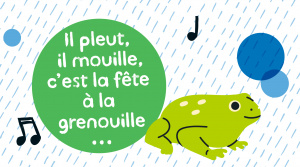Language/French/Grammar/Impersonal-Verbs
Jump to navigation
Jump to search
Rate this lesson:
Personal and Impersonal Verbs
Impersonal verbs
Most verbs are personal: they must be conjugated to different persons, such as:
- Example: "manger" (to eat): je mange (I eat), tu manges (you eat), etc.
However, some verbs are used impersonaly, meaning they only have one conjugation, the third person singular.
- Example: we can say "Il pleut". However, we cannot say "Je pleus".
- See also the impersonal form.
Video - French Impersonal Verbs Examples : Valoir, Falloir, Pleuvoir
Video - comptine pour enfants (nursery rhyme) : "Il pleut il mouille"
Children know how to use impersonal verbs like in this rhyme: "il pleut, il mouille, c'est la fête à la grenouille" (it's raining, it's wet, it's a frog party). 😄
We can use the traditional verb, “pleuvoir”, as well as the transitive verb, “mouiller”. The latter is used more colloquially, and it indicates greater intensity of rain.
Videos
French Impersonal Verbs in French : Valoir, Falloir, Pleuvoir - YouTube
French IMPERSONAL VERBS // French conjugation Course ...
Other Lessons
- Common Mistakes
- Plurals of nouns ending in eu, au, eau
- Gender of the noun indicated by its final letter
- How to Guess the Gender of French Nouns
- Omission of the article in participle + noun constructions linked by de
- Adverbs ending in —ément derived from adjectives ending in —e
- Omission of the article in set phrases and verbal constructions
- Collective nouns
- Changes in the stem form of some —er conjugation verbs
- Position of object pronouns with faire, laisser, envoyer or verbs of perception + infinitive
- Agreement of past participles with direct objects placed before in relative clauses
- Plural of Nouns
- Use of stressed pronouns for emphasis
- Polite Form
- Plural


